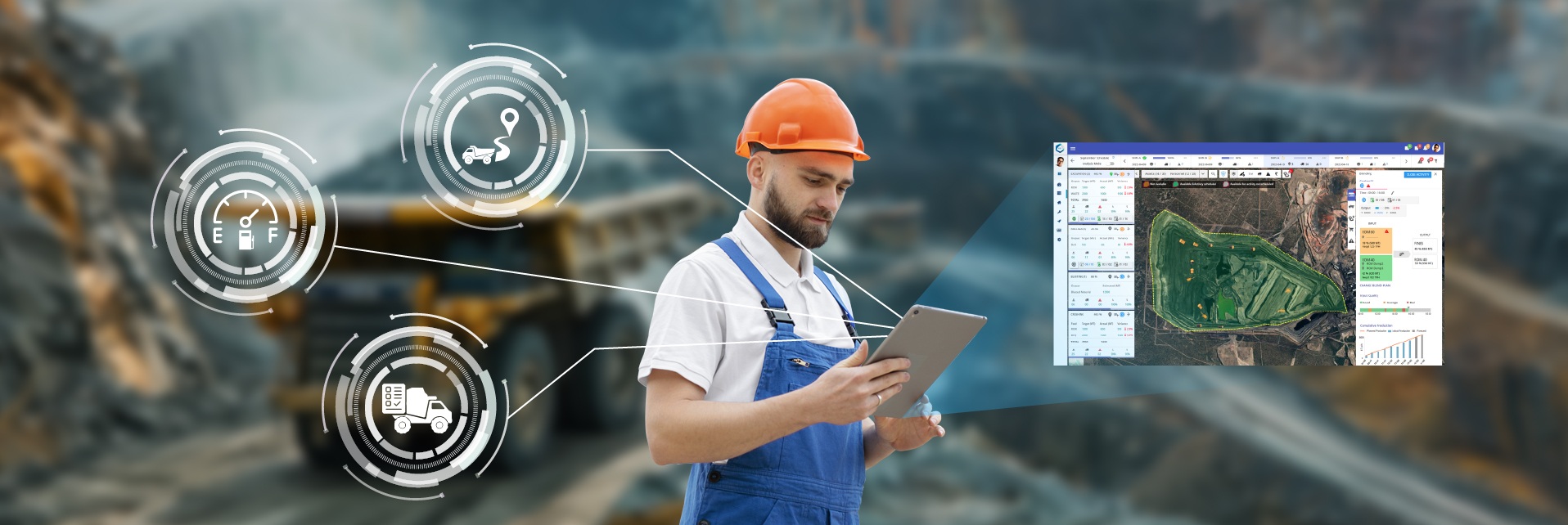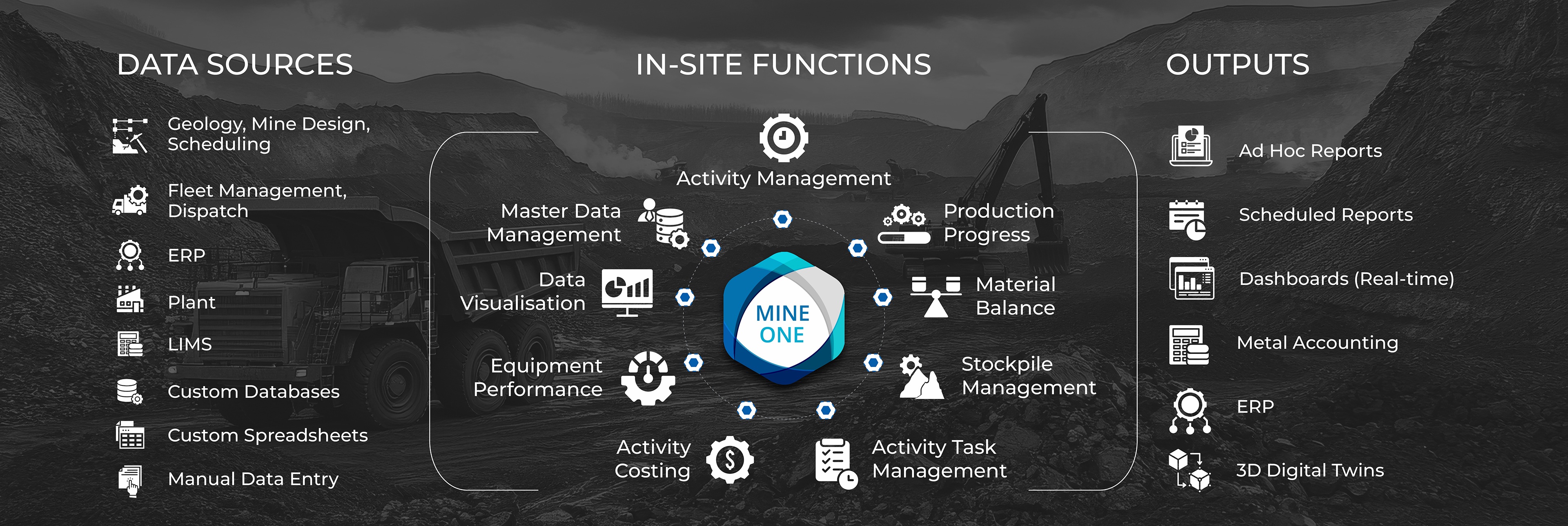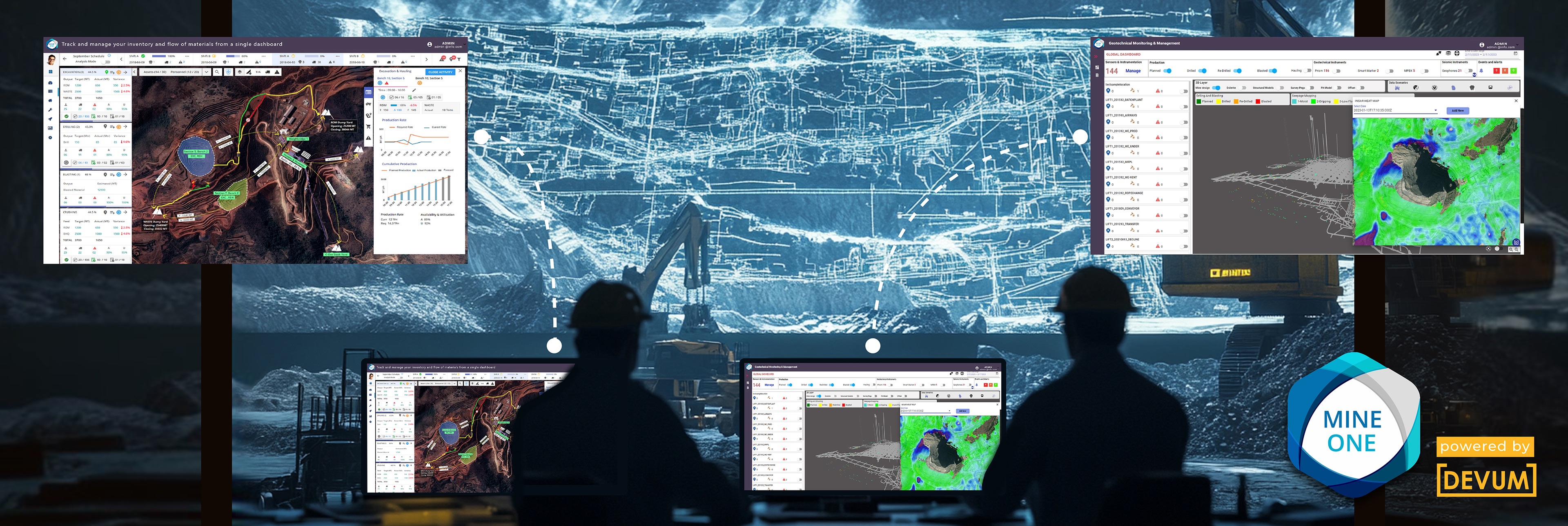
Fuel Management Solution: How Reactore Transforms Fuel Tracking and Fleet Efficiency?
Reactore
•
June 30, 2025
Why Fuel Management Matters More Than Ever?
Fuel is often one of the largest operational expenditures for businesses relying on vehicle fleets or heavy equipment. Industry data indicate that fuel costs can account for roughly 40% of total fleet operating expenses.1 Additionally, losses due to theft or misallocation may amount to 5–10% of annual fuel consumption, further emphasising the critical need for robust management.2
With global fuel prices subject to volatility due to geopolitical factors and market fluctuations, organisations face increasing pressure to manage fuel consumption effectively. For industries such as mining, logistics, construction and distribution, even marginal improvements in fuel efficiency can translate to significant cost savings and enhanced competitiveness.
Limitations of Traditional Methods
Traditional approaches to monitoring fuel usage like manual fuel logs, fuel cards without real-time verification, and siloed spreadsheets — no longer suffice today. These methods tend to be prone to errors, delays in data consolidation, and vulnerability to misuse or theft. Without timely, accurate insights, fleet managers struggle to identify inefficiencies or irregularities until after the fact, missing opportunities for immediate corrective action.
This blog delves into the changing landscape of fuel management. We explore the definition and scope of a modern fuel management solution, outline the challenges fleets commonly face, detail the features of best-in-class systems, survey leading sensor technologies, and examine why Reactore’s offering stands out. By the end, you will appreciate how an intelligent, integrated fuel management solution can help your organisation reduce costs, enhance operational efficiency and support sustainability goals.
What Is a Fuel Management Solution?
A fuel management solution is a comprehensive technology-driven system designed to monitor, track, control and analyse fuel consumption across an entire fleet or equipment pool in real-time. It unites hardware components such as fuel level sensors, flow meters and telematics devices with software applications that aggregate data, to generate insights and provide actionable recommendations.
At its core, a fuel management system captures data from multiple sources: fuel tank sensors that record level fluctuations, GPS and Electronic Logging Devices (ELDs) that log vehicle location and engine runtime, and refuelling point integrations that record volume dispensed. This raw data is consolidated into a central platform, offering intuitive dashboards and customisable reports to fleet managers and decision-makers. Rather than waiting days or weeks to spot anomalies, stakeholders can view live fuel consumption trends, receive alerts for unusual activity, and drill down into historical records for audit and compliance purposes.
Adoption of fuel management solutions marks a shift away from fragmented, manual processes. In place of post-facto consolidation of receipts and logs, modern fleets embrace digital automation to ensure data accuracy, reduce administrative overhead, and empower rapid decision-making. By deploying an integrated system, organisations can align fuel usage with broader operational objectives, such as optimising routes, enforcing driving best practices and planning maintenance schedules to minimise downtime.
Key Challenges in Fuel Management for Fleets
Effective fuel management is often hindered by several entrenched challenges:
- Fuel Theft and Leakage: In remote or unmanned sites, unauthorised siphoning of fuel can go undetected for extended periods, leading to substantial losses. Leakage due to equipment faults or worn seals further exacerbates waste.
- Excessive Idling and Suboptimal Driving Habits: Drivers may inadvertently or deliberately idle engines for prolonged periods. Harsh acceleration, abrupt braking and failure to adhere to planned routes can all drive fuel consumption beyond expected levels.
- Lack of Accountability and Transparency: Without real-time visibility, it is difficult to assign accountability to individual drivers or operators. Manual logs can be falsified or delayed, limiting enforcement of best practices.
- Fragmented, Disconnected Systems: Many fleets rely on multiple, isolated tools—fuel card data in one system, telematics data in another, and manual spreadsheets maintained separately. This fragmentation impedes timely insight, as data reconciliation may take days and still be prone to inconsistencies.
- Regulatory and Compliance Pressures: Certain industries and jurisdictions require detailed fuel reporting for tax or environmental regulations. Inaccurate records can lead to penalties or damage to the corporate reputation.
- Environmental and Sustainability Goals: Organisations increasingly aim to reduce carbon footprints. Without precise fuel monitoring, measuring progress against sustainability targets becomes difficult.
A robust fuel tracking system addresses these challenges by centralising data, automating logging processes, detecting anomalies in near real time, and empowering managers with actionable insights.
Features of a Best-in-Class Fuel Management System
A leading fuel management system offers more than rudimentary fuel level readings. Key capabilities include:
These features combine to shift fuel management from reactive cost-control to proactive optimisation, enhancing both the bottom line and operational resilience.
Top Fuel Management Sensors in the Market
Hardware sensors form the data collection foundation of any fuel management system. Leading sensor technologies include:
- Fuel Level Sensors (FLS): Installed within tanks to measure fuel volume. Modern FLS options include resistive, capacitive and ultrasonic variants, each offering different levels of precision and installation complexity. High-precision sensors detect minor level changes and support early theft detection.
- Flow Meters: Deployed at refuelling points or integrated into vehicle fuel lines, flow meters measure the exact volume of fuel dispensed in each refuelling event. They ensure accurate logging and reconciliation between dispensed volume and tank-level changes.
- GPS and Electronic Logging Devices (ELDs):While not fuel-specific, these devices correlate location, engine runtime and operational context with fuel consumption. This integration is crucial for determining fuel usage per trip and identifying inefficiencies related to routing or idling.
- RFID-based Access Controls: Systems requiring drivers to authenticate via RFID cards or tags before fuelling. This links each transaction to a specific individual, deterring unauthorised refuelling and improving accountability.
- Ultrasonic Sensors: Non-invasive sensors fitted externally on tanks to measure fluid level via sound waves. They avoid modifications to tank interiors, beneficial for certain fleet types or retrofits.
- Capacitive Sensors: Measure changes in capacitance relative to fuel level, offering reliable accuracy in a variety of tank shapes and fuels. Installation may require accessing tank interiors but provides precise readings.
- Temperature and Pressure Sensors (Auxiliary): Monitor tank environment conditions to detect leaks or fuel quality issues, sometimes used in conjunction with primary level sensors.
Selecting sensor hardware involves balancing factors such as fleet size, tank types, operating environments (e.g. harsh conditions in mining), installation costs and integration requirements. Bundles combining compatible sensors with a unified software platform simplify deployment and ensure data consistency. When choosing sensors:
- Confirm compatibility with the chosen fuel management software.
- Evaluate installation complexity and maintenance needs.
- Assess precision requirements: high-value operations may need more granular measurements.
- Consider environmental resilience – sensors for off-road machinery must withstand vibration, dust and extreme temperatures.
By pairing robust hardware with an intelligent software layer, organisations gain reliable data streams that underpin accurate analytics and timely decision-making.
Why Reactore Offers the Best Fuel Management Solution for Fleets
Reactore’s Fuel Management Solution is powered by Devum, an AI-enabled low-code application platform, engineered for modern fleets that demand accuracy, agility and scalability. Key differentiators include:
- Modular and Customisable Platform: Organisations can select the modules relevant to their operations – fuel management, telematics, maintenance or analytics, and tailor workflows to industry-specific requirements, whether mining, logistics or construction.
- Live Dashboards with Geolocation-based Insights: Real-time visualisation of fuel levels, consumption patterns and vehicle locations on interactive maps. Managers can filter views by region, asset type or driver to pinpoint concerns.
- Role-based Mobile Apps: Distinct interfaces for drivers (to authorise refuels, view consumption targets), supervisors (to monitor anomalies in real time) and maintenance teams(to receive alerts on sensor faults or leaks). This ensures that the right stakeholders receive relevant data at the right time.
- Proven Impact Metrics: Deployed at scale, Reactore’s clients have experienced up to 90% reduction in fuel theft, a 20% decrease in overall fuel costs and a 30% improvement in operational efficiency. These figures are derived from aggregated customer data across multiple deployments, showcasing tangible ROI.*
- Seamless Integration: Reactore connects Fuel Management with other Fleet Management Solution modules (maintenance scheduling, driver performance tracking, vehicle health diagnostics, etc.). For example, linking fuel data with engine performance metrics can reveal if an underperforming engine contributes to higher consumption, prompting timely maintenance.
- Custom Workflows for Industry Needs: In mining, for instance, Reactore can integrate with on-site refuelling stations and remote pumps; in long-haul logistics, it supports disparate refuelling points and varied fuel card networks. Flexible configuration ensures the solution fits existing processes rather than forcing rigid changes.
- User-Friendly Implementation and Support: A dedicated onboarding process includes site surveys, sensor installation guidance, and staff training. Post-deployment, Reactore offers continuous support and regular updates, ensuring the system evolves alongside operational needs.

Comparison with Traditional Systems
- Reactore vs Spreadsheets/Manual Logs: Manual methods lack timeliness and are error prone. Reactore automates data collection, eliminating manual reconciliation and providing immediate insights.
- Reactore vs Basic Sensor-only Systems: Some vendors offer sensors without an integrated analytics layer. While raw data is captured, without advanced analytics and contextualisation (e.g., linking GPS data or driver profiles), opportunities for deep insights are limited. Reactore’s unified platform ensures end-to-end visibility, contextual analysis and actionable recommendations.
- Reactore vs Legacy Telematics: Older telematics solutions may track location and engine hours but lack fine-grained fuel analytics or AI-driven alerts. Reactore modernises fleet management by embedding intelligent fuel management within a broader asset management ecosystem.
Through these capabilities, Reactore transforms fuel management from a reactive, administrative task into a proactive, strategic asset that drives cost savings, operational agility and sustainability.
Industry Applications: Who Benefits from Fuel Management Solutions?
Fuel management solutions are relevant across diverse sectors. Reactore’s platform caters to the following:
- Mining and Heavy Equipment Operations: Remote sites often have on-site fuel storage and multiple heavy machines. Real-time monitoring prevents siphoning, ensures timely refuelling schedules and optimises machine utilisation. Data insights help plan maintenance to avoid fuel-inefficient engine performance.
- Logistics and Long-Haul Transportation: Fleets travelling across regions need visibility into fuel consumption per trip. By analysing route-specific fuel usage, managers can recommend optimal refuelling stops, reduce idling at depots and enforce efficient driving behaviours.
- Manufacturing Units and Distribution Centres: Internal fleets (forklifts, delivery vans)benefit from monitoring to prevent unauthorised fuel use and manage budgets. Integration with scheduling systems helps align deliveries with fuel availability, reducing delays.
- Public Utilities and Government Fleets: These entities often face strict public accountability and compliance requirements. Transparent fuel records help demonstrate proper use of public resources, detect early misuse, and support audit processes.
- Construction and Infrastructure Projects: Mobile plant and equipment at varying sites require flexible monitoring. Reactore’s modular approach allows quick deployment across new project locations, maintaining consistent fuel oversight.
In each sector, the core benefits – cost savings, theft prevention, efficiency gains and compliance support, remain consistent, though specific workflows and integration points differ.
Real World Impact: Results from the Field
Quantifiable results underscore the value of a robust fuel management solution:
- Fuel Theft Reduction: In a large mining operation, implementation of Reactore’s sensor-integrated platform and RFID access controls led to a 90% drop in unauthorised fuel withdrawals within months.
- Cost Savings: A logistics provider monitoring fuel usage across a 200-vehicle fleet recorded a 20% decrease in fuel expenditure by optimising refuelling locations, reducing idling times and improving route planning based on consumption analytics.
- Efficiency Improvements: A manufacturing client improved machine utilisation by 30% by correlating fuel consumption data with maintenance schedules, identifying underperforming equipment earlier and avoiding fuel-wasteful breakdowns.
- Audit and Compliance Efficiency: Automated logging and consolidated dashboards reduced time spent on fuel-related audit preparations by 50%, while enhancing record accuracy for regulatory reviews.
- Environmental Impact: By tracking and analysing fuel consumption patterns, several clients reported measurable reductions in carbon emissions, supporting corporate sustainability targets and ESG reporting.
These real-world outcomes illustrate how Reactore’s solution not only delivers immediate financial benefits but also fosters long-term operational resilience and environmental stewardship.
The Future of Fuel Management: Smarter, Greener, More Integrated
Fuel management continues to evolve under multiple converging trends:
- AI and Predictive Analytics: Beyond anomaly detection, advanced AI models can forecast fuel needs based on historical patterns, seasonal variations and operational plans. Predictive insights enable proactive scheduling of refuelling and maintenance, further reducing downtime.
- Fleet Electrification and Hybrid Tracking: As electric vehicles (EVs) and hybrid machinery become more prevalent, fuel management platforms must adapt to monitor battery usage alongside traditional fuels. Reactore is able to integrate with EVs and capture energy consumption metrics for EVs, enabling unified oversight of mixed-power fleets.
- Sustainability and Carbon Accounting: Organisations increasingly tie fuel consumption data to carbon footprint calculations, reporting progress against environmental commitments. A comprehensive fuel management system serves as a cornerstone for sustainability initiatives, providing accurate data for ESG disclosures.
- IoT and Edge Computing: Emerging IoT devices and edge processing capabilities allow preliminary data analysis directly on sensors or gateways, reducing latency for critical alerts in remote areas. Devum’s architecture supports edge-enabled deployments for environments with limited connectivity.
- Integration with Broader Ecosystems: Future platforms will seamlessly connect fuel data with procurement systems (to forecast fuel purchases), financial systems (for budget tracking)and supply chain platforms (to optimise fuel sourcing). Devum’s microservices architecture facilitate such integrations, ensuring the fuel management solution remains central to enterprise operations.
Learn how Devum makes systems integration seamless. - Enhanced User Experience: Intuitive interfaces, voice-assisted reporting, and augmented-reality support for field technicians diagnosing sensor issues will further streamline fuel management practices.
By investing in scalable, future-ready fuel management technology today, organisations position themselves to capitalise on these advancements and maintain a competitive edge.
Conclusion: Why Reactore’s Fuel Management Solution Stands Out?
In an era where fuel costs and sustainability demands are intensifying, effective fuel management is indispensable. Reactore’s comprehensive solution unites high-precision sensors, telematics integration, AI-driven analytics and user-centric mobile applications into a cohesive platform. The results, end-to-end visibility, robust anomaly detection, and actionable insights that drive substantial cost savings, operational efficiency, and environmental benefits.
Whether operating in mining, logistics, manufacturing or public services, organisations can tailor Reactore’s modular fuel management solution to their specific workflows and infrastructure. With proven results like reduction in fuel theft up to 90%, 20% increase in cost savings and 30% efficiency gains, Reactore demonstrates tangible ROI and strategic value.*
_______________________________________
1 “41+ Fleet Industry Statistics (2023).” Gitnux, 13 Dec. 2023, https://gitnux.org/fleet-industry-statistics/. Accessed 30 June 2025.
2 “Avoid Fleet Card Skimming with Two‑Factor Authentication.” WEX, 19 May 2025, www.wexinc.com/resources/blog/keep-your-fleet-cards-secure-from-skimming-with-added-features-including-two-factor-authentication/. Accessed 30 June 2025.
* All values are derived under test conditions. These values may vary based on the actual conditions of the mine, and usage of the system and user decision making.
Related Blogs
Get in touch with one of our mining technology gurus and learn how Reactore can assist with digital transformation possibilities.
Our Al-powered low-code application platform is a cost-effective alternative to traditional software development options. Build your dream app today!



















